Image Credits:-
Many thanks to Penny Rogers and Bridge House Publishing for supplying book cover and author shots. Other images created in Book Brush using images from them or from Pixabay using their photos. One image from a past Bridge House Publishing celebration event was taken by me, Allison Symes.
It is always a joy to welcome fellow authors to Chandler’s Ford Today, especially when they are fellow Bridge House Publishing writers. Penny Dale, who writes as Penny Rogers, is someone I have often chatted to at the Bridge House Publishing Celebration Event held annually in December.
Penny has had many stories in The Best of CafeLit anthologies. Indeed she and I have had our work in the same books but it is a great joy to congratulate Penny on her forthcoming book, Amelie at the Window.
The title story started life as a short story but other stories about Amelie’s life emerged in response to popular demand and this led to the book being written. It is written in two halves as a collection of short stories about the people who lived in a fictional small town in France in 1914 and again in 1924. So much happened in those ten years.
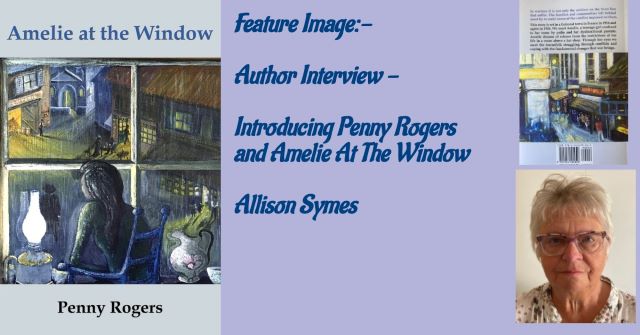
About The Author
Penny Rogers is the writing name of Penny Dale; she uses the pseudonym to prevent any confusion with the marvellous writer and illustrator of children’s books who is also called Penny Dale.
Before retirement Penny was an academic librarian, and in this capacity edited and contributed to books on learning environments in universities. She wrote and presented academic and technical papers on learning spaces, as well as development and training for staff in higher education library and information services.
These days Penny writes mostly short stories and flash fiction and enjoys trying out different styles and genres. She has stories in anthologies published by Bridge House, Henshaw Press, and the Dorset Writers Network. She is a regular contributor to CaféLit and has had stories published by Spillwords, Funny Pearls, Bare Fiction and Writers Forum. She has been runner-up in the Mani Literary Festival competition and has been short listed for the Bridport Prize for flash fiction.
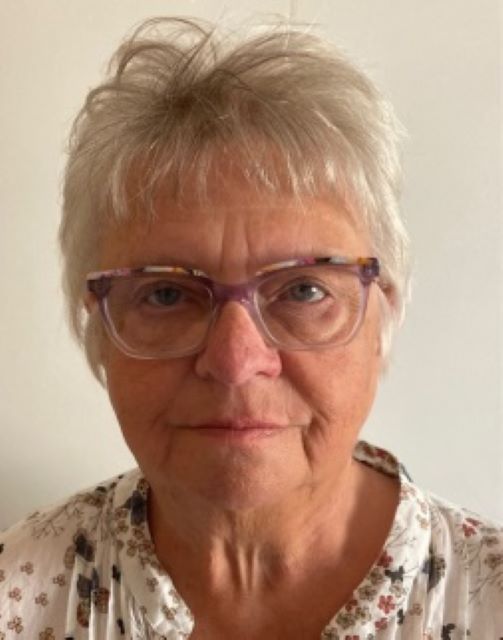
In her home town, Penny facilitates a writing group that meets to offer mutual support and encouragement. She is also a member of a local poetry group and was on the management team for SOUTH poetry magazine until it ceased publication in 2024.
When not writing, Penny enjoys knitting, preserving fruits and vegetables from her garden, and visiting historic buildings. She is particularly fond of old churches and is inspired by their history, architecture, and continuing contribution to their communities. She is especially good at sitting in her beautiful garden, advising the gardener and planning her next story.
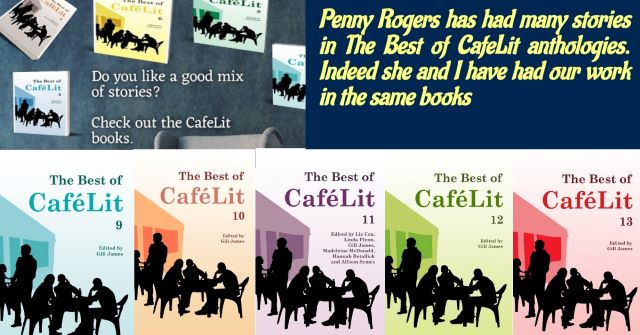
About Amelie At The Window
Amelie at the Window began as a short story written in 2014. The response from readers was positive and unanimous; they wanted to read more about Amelie and her world. Slowly the stories about her life, her hopes and dreams, emerged. At the same time the other characters developed, some in ways that were almost predestined but with some able to take advantage of the changes in society brought about by World War 1. This was especially true for the women, their aspirations beginning to be realised as they gradually widened their roles in society.
So, Amelie at the Window is essentially a collection of short stories about the people who lived in a fictional small town in France in 1914 and again in 1924. Each story takes the reader deeper into the lives of the town’s inhabitants, and the reader will find the same event described and recalled in several ways by different people.
Welcome to Chandler’s Ford Today, Penny.
Penny, what was it you loved about writing Amelie At The Window? What did you find the most challenging aspect (especially given you use two time periods)? Are you especially drawn to 1914 and 1924 and why do you think this is?
I really enjoyed getting to know the characters, finding out their stories and slowly realising what their hopes and dreams, their aspirations, might be. There were times during the writing when I felt I knew more about my characters than I did about people close to me.
As for the most challenging, it was probably the reverse of what I’ve said above and understanding there can’t always be happy endings for characters I have come to cherish. I’ll come back to this again later in this interview.
I don’t have a particular affinity with 1914 and 1924, but do find it interesting people often refer to changes over relatively small periods of time. Growing up in the 1950s I remember a lot of grown-up conversations starting with ‘Before the war…’ and now the phrase ‘Well, it was before Covid we went to Ibiza …’ (or whatever!) is often heard.
Who are you aiming Amelie At The Window at and why do you think it would appeal? Will you be having events to celebrate the launch of the book?
I hope all sorts of people will find this book accessible and enjoyable. While it is primarily directed at an adult audience, my hope is it might be used to introduce younger readers to, for example, the social history aspects of the story and the long term effects of conflict. Amelie could also give young people an insight into the parlous nature of life in the early years of the twentieth century.
There will certainly be launch events. The first was held before the publication date. My home town of Verwood, not far away from Chandlers Ford, on the border between Dorset and Hampshire, held its first ever book fair in the middle of October. I booked a table with considerable trepidation! Would anyone come? Would anyone talk to me? Would anyone buy a copy of Amelie? I need not have worried. The event was packed until the end with youngsters, older people, individuals and families all willing to talk about books and reading.
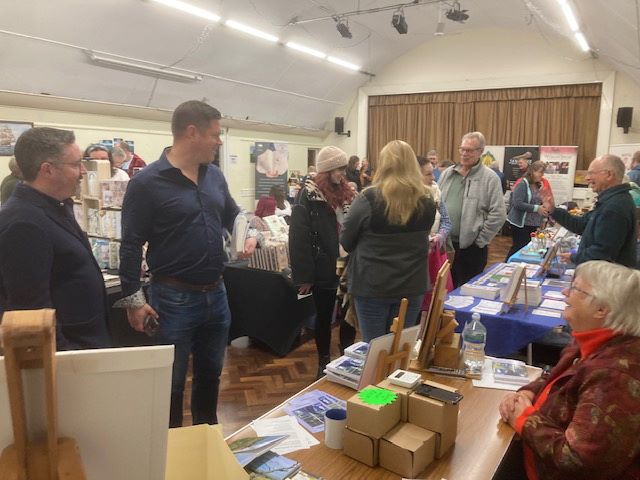
I’m planning a launch in Verwood Library to take place in the afternoon of Friday 14 November. So if anyone from Chandlers Ford is in the area, please come and say hello. I hope to visit other libraries and communities over the coming months to talk to reading and other groups not only about Amelie, but also about writing and getting published as an older writer.
Update: Bridge House Publishing are also hosting an online event (via Eventbrite) for Penny on 20th November 2025 from 7pm to 8pm. Tickets are free.
You can also find Penny’s social media and buy links at the end of the interview.
Without giving too much away, Amelie is a sharp observer of life, made that way by circumstances. You’ve used a polio outbreak, a known historical event. This is a great way of bringing history to life by showing a character going through something like this, surviving but with consequences, and a reader understanding the impact. Were you tempted to make Amelie’s life easier? Or was that impact what you wanted? Amelie’s sharp observational skills reminded me of those of Anne Frank – was that the intention?
I was very tempted to make Amelie’s life easier. As I mentioned earlier, I felt for my characters. But I had to be realistic to the period; a time before antibiotics and advanced surgery, before female emancipation and workers’ rights and certainly before the psychological damage inflicted by war was properly understood. Again, I remember as a little girl seeing men shaking, shouting and cowering, and my parents explaining it as ‘shell shock’.
I can honestly say I did not think of Anne Frank and I’m humbled to hear you make the connection. At the back of my mind I had some writers who have been isolated and restricted by illness, notably John Keats in On First Looking into Chapman’s Homer and Jean-Dominic Bauby’s The Diving Bell and The Butterfly. But I let Amelie develop her own observational skills, dream her dreams and unwittingly contribute so much to her town, especially the girls who live there.
What drew you into writing short stories and flash fiction? What do you love most about writing in the short forms? What would you say were the challenges? How did you discover Bridge House Publishing?
I am sometimes asked when I’m going to write a full length novel. The answer is, and has always been, ‘never’. I just don’t have a novel in me. What I do have is an active imagination and a love of fine words; I think it was Flaubert who used the phrase ‘Le mot juste’. So I enjoy trying to say a lot in few words and honing those words to make a story as visual as possible. As for the challenges, I’m fortunate in that I think the main challenge to short story writing is to focus on one aspect of the character (or plot if it’s that sort of story) and develop that aspect, which is precisely what I enjoy doing.
I discovered Bridge House Publishing when I was in a writing group with a wonderful writer, Gail Aldwin. She introduced me to CaféLit. Eventually I plucked up the courage to submit something. I try to pass the baton on by encouraging new writers to read the stories on CaféLit and submit to it and other Bridge House publications.
I always ask writers new to Chandler’s Ford Today this question. Can you name three writing tips you’ve found useful? Can you name three marketing tips you’ve found useful? Also, do you enjoy marketing?
Writing Tips:-
‘What if…’ I just find this question so helpful if I’m stuck.
Don’t be afraid to do something else. I knit socks, and I’m so slow eventually I realise I’d be better off writing. Seriously, if I just can’t write, or I’m writing rubbish, I leave it and do something else.
I share my writing with a few trusted people for feedback; people who I know will give helpful and reasoned criticism. If you ask too many people there’s the risk of getting a plethora of not always pertinent comments to wade through.
Marketing
Many years ago I worked for an advertising agency and a lot of what I learned then is now somewhere in my DNA. So I do have ideas for launches, contacting bookshops, designing merchandise and using social media. But I don’t have the energy I used to have, and my mobility is somewhat restricted. But I’m having a go. Talking to you is a start, and I mentioned the Book Fair and the forthcoming launch in the library. My clever daughter has designed bookmarks, flyers and even mugs to promote Amelie. And there are copies of Amelie in Gullivers, an independent bookshop in Wimborne Minster. So, unfortunately I don’t have three tips yet, in six months time I might.
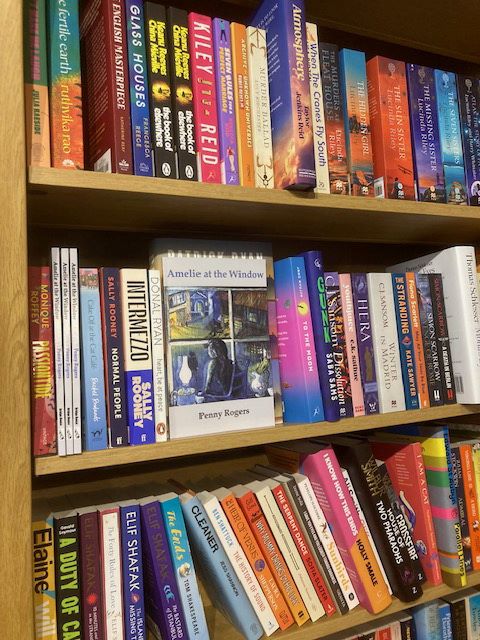
Which historical books, fiction or otherwise, have most influenced you and why? Do you have a favourite short story? (I always recommend Lamb To The Slaughter by Roald Dahl).
For Amelie, it would have to be All Quiet on the Western Front by Erich Maria Remarque. The disconnect from civilian life in the face of unrelenting brutality experienced by Paul Baumer was constantly at the back of my mind. As for favourite short story, it has to be The Open Window by Saki. Saki is probably not widely read today, his late Victorian/Edwardian stories are of their time and can make for uncomfortable reading. But they are also gems of observation and humour, and often have a delightful twist at the end.
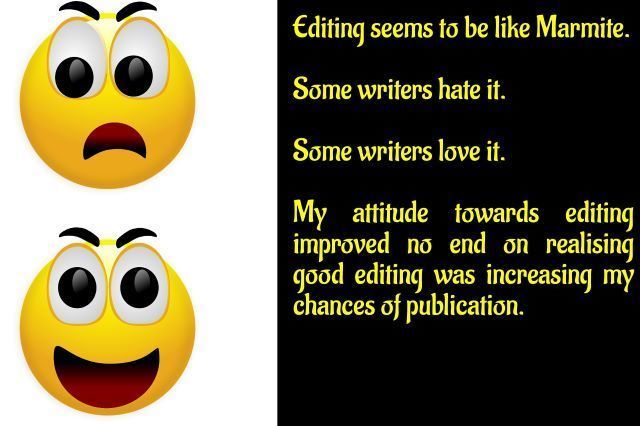
It’s time for what I’ve found is the Marmite question. Do you like or loathe editing, Penny? I love it but appreciate this is not always the case for writers.
Have to say I love it as well! I don’t find it straightforward though. I always say writing the story is the easy part, then the work starts. But as I said before, I like worrying about the right word or phrase. I have been known to wake up in the middle of the night with the answer to an editing problem.
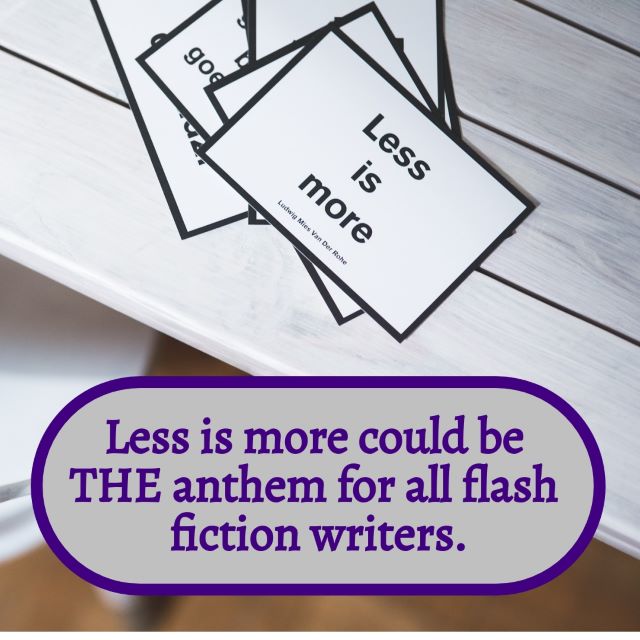
Did you begin your writing career with short stories/flash fiction or did you come to this later? It was the latter case for me, not that I’ve regretted this.
I began with academic and research writing and only started to write creatively when I retired. It was hard to move from carefully researched, factual writing that relied on referencing peer reviewed material, to spinning yarns. It took a long time to be able to make things up, shift the passage of time around, and at the end of the day tell porkie pies. That said, I do enjoy research and I relished the fact checking I did for Amelie.
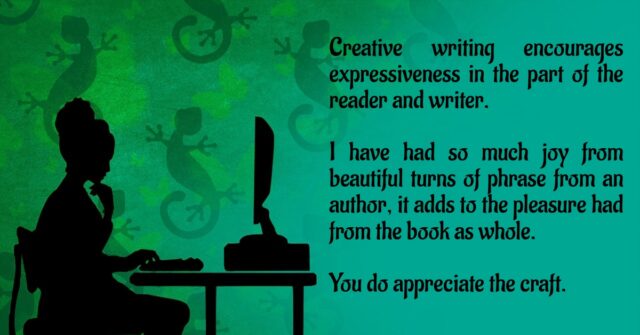
Having written for a while now, is there something you know now as a writer you wished you’d known when starting out? I’d have appreciated a heads up to allow plenty of time, because things can take longer than you think, and not to fear editing but to see it as making your work better and for it to have a better chance of doing well “out there”.
As mentioned, I came late to creative writing and had no idea what to expect. I didn’t have any expectation I would ever be published. So I agree with you saying allow plenty of time. I needed to build skills, technique, confidence and learn how to respond to the contemporary writing market. There’s so much more than traditional publishing routes: self-publishing, hybrid publishing, online publishing, home-produced chapbooks to name a few. I must say, however, nothing compares to holding a book published by Bridge House.

Last but not least, Penny, can you share with us what you are working on now (or hope to be working on soon)?
Well, I think you are partly to blame for this, Allison. At long last I’ve started to look at the short stories and flash fiction I’ve written over the last decade to see if I can put together an author collection. Watch this space.
Allison: I never mind being blamed for something like this! Good luck, Penny.
Many thanks, Penny, for a superb interview and good luck with Amelie at the Window. She is a haunting character who stays with you, not an easy thing to achieve.
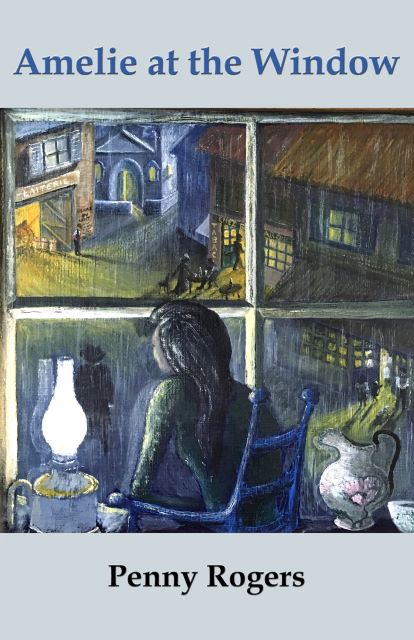
Conclusion
Don’t let anyone tell you writing a good short story is easy. It takes crafting and editing just as much as the longer works do. I also feel any errors will show up more in the short forms of fiction so think that puts a bit more pressure on the writer of these to get their works right!
But when it is right, when you have characters who stay with you, that is such a joy to read and an even greater joy when you know you have written stories like this.
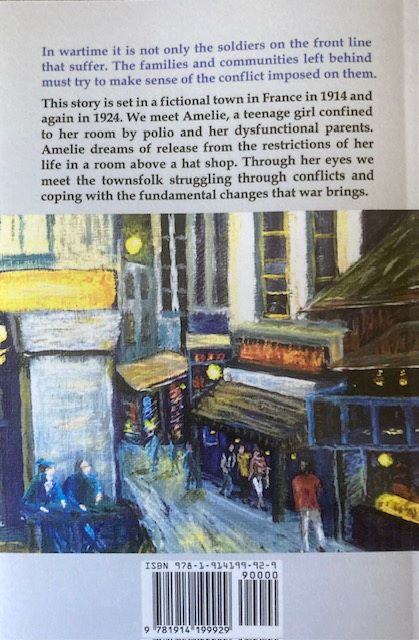
Penny Rogers – Social Media and Buy Links
At the moment Amelie at the Window is available from:-
Social Media
Facebook – Penny Rogers writer
Instagram – Penny_Rogers_Writer
Related Posts:-
Read interviews with Chandler’s Ford writer Allison Symes: Part 1 and Part 2.
Read blog posts by Allison Symes published on Chandler’s Ford Today.
Never miss out on another blog post. Subscribe here:


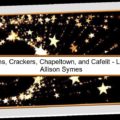



Leave a Reply